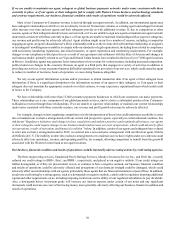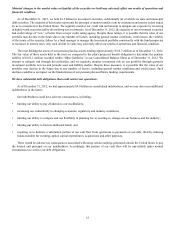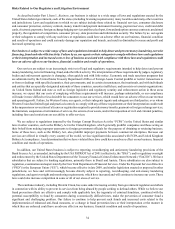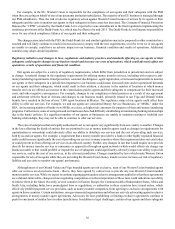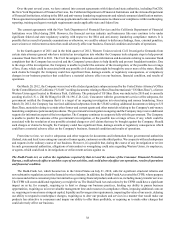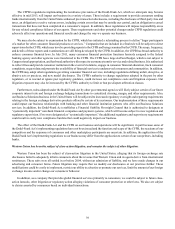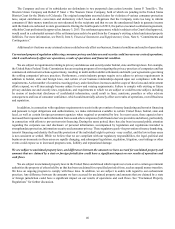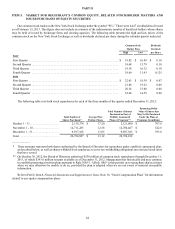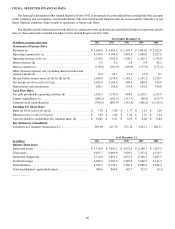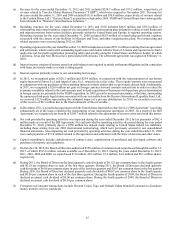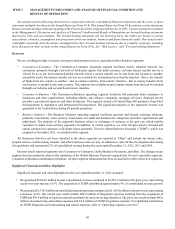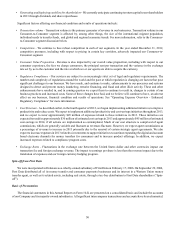Western Union 2012 Annual Report Download - page 45
Download and view the complete annual report
Please find page 45 of the 2012 Western Union annual report below. You can navigate through the pages in the report by either clicking on the pages listed below, or by using the keyword search tool below to find specific information within the annual report.40
The Company and one of its subsidiaries are defendants in two purported class action lawsuits: James P. Tennille v. The
Western Union Company and Robert P. Smet v. The Western Union Company, both of which are pending in the United States
District Court for the District of Colorado. The original complaints asserted claims for violation of various consumer protection
laws, unjust enrichment, conversion and declaratory relief, based on allegations that the Company waits too long to inform
consumers if their money transfers are not redeemed by the recipients and that we use the unredeemed funds to generate income
until the funds are escheated to state governments. During the fourth quarter of 2012, the parties executed a settlement agreement,
which the Court preliminarily approved on January 3, 2013. The settlement agreement, which is subject to the Court's final approval,
would result in a substantial amount of the settlement proceeds to be paid from the Company's existing related unclaimed property
liabilities. For more information, see Part II, Item 8, Financial Statements and Supplementary Data, Note 6, “Commitments and
Contingencies.”
Additional civil actions or any criminal actions could adversely affect our business, financial condition and results of operations.
Current and proposed regulation addressing consumer privacy and data use and security could increase our costs of operations,
which could adversely affect our operations, results of operations and financial condition.
We are subject to requirements relating to privacy and data use and security under federal, state and foreign laws. For example,
the United States Federal Trade Commission has an on-going program of investigating the privacy practices of companies and has
commenced enforcement actions against many, resulting in multi-million dollar settlements and multi-year agreements governing
the settling companies' privacy practices. Furthermore, certain industry groups require us to adhere to privacy requirements in
addition to federal, state and foreign laws, and certain of our business relationships depend upon our compliance with these
requirements. As the number of countries enacting privacy and related laws increases and the scope of these laws and enforcement
efforts expand, we will increasingly become subject to new and varying requirements. Failure to comply with existing or future
privacy and data use and security laws, regulations, and requirements to which we are subject or could become subject, including
by reason of inadvertent disclosure of confidential information, could result in fines, sanctions, penalties or other adverse
consequences and loss of consumer confidence, which could materially adversely affect our results of operations, overall business
and reputation.
In addition, in connection with regulatory requirements to assist in the prevention of money laundering and terrorist financing
and pursuant to legal obligations and authorizations, we make information available to certain United States federal, state and
local, as well as certain foreign government agencies when required or permitted by law. In recent years, these agencies have
increased their requests for such information from us and other companies (both financial service providers and others), particularly
in connection with efforts to prevent terrorist financing. During the same period, there has also been increased public attention
regarding the corporate use and disclosure of personal information, accompanied by legislation and regulations intended to
strengthen data protection, information security and consumer privacy. These regulatory goals - the prevention of money laundering,
terrorist financing and identity theft and the protection of the individual's right to privacy - may conflict, and the law in these areas
is not consistent or settled. While we believe that we are compliant with our regulatory responsibilities, the legal, political and
business environments in these areas are rapidly changing, and subsequent legislation, regulation, litigation, court rulings or other
events could expose us to increased program costs, liability and reputational damage.
We are subject to unclaimed property laws, and differences between the amounts we have accrued for unclaimed property and
amounts that are claimed by a state or foreign jurisdiction could have a significant impact on our results of operations and
cash flows.
We are subject to unclaimed property laws in the United States and abroad which require us to turn over to certain government
authorities the property of others held by us that has been unclaimed for a specified period of time, such as unpaid money transfers.
We have an ongoing program to comply with those laws. In addition, we are subject to audits with regard to our escheatment
practices. Any difference between the amounts we have accrued for unclaimed property and amounts that are claimed by a state
or foreign jurisdiction could have a significant impact on our results of operations and cash flows. See “Unclaimed Property
Regulations” for further discussion.


